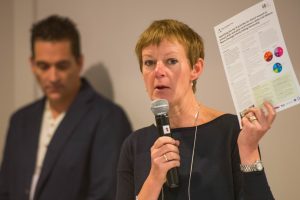
One Cancer Voice
brainstrust has signed this manifesto and is part of a coalition of twenty cancer charities, recommending solutions for some of the biggest issues people face when living with cancer.
brainstrust director of services and policy, Helen Bulbeck, reflects here on how the manifesto will be meaningful for the brain tumour community.
“As we embark on our new strategy, ‘first, we are people’, we fully support the One Cancer Voice manifesto which seeks to address the broad challenges that people face when diagnosed with cancer. We believe that each of the 6 points of this manifesto will help families affected by a cancer diagnosis to achieve a better quality of life, but we are also committed to ensuring that in the face of this broad manifesto that the specific needs of the brain tumour community are taken into account as work to achieve these goals progresses. My view is that we will make this meaningful for our brain cancer community.”
What does this look like?
1. Put the right staff in place – we’re working with the TJBCM (Tessa Jowell Brain Cancer Mission) to regenerate the neuro-oncology workforce. This includes a need for more neuro-radiologists to read brain scans and medical oncologists to translate research into the clinics.
2. Diagnose cancer earlier – we’d like to see prompt diagnosis. Whilst earlier diagnosis may be beneficial, you have to counter this with the knowledge that the earlier you are diagnosed, the longer you live with the knowledge that you have a life limiting diagnosis. This is hard when there are no curative treatments.
3. Ensure people living with cancer have access to the appropriate treatment and psychological support – we know that an improved quality of life can lead to a better outcome. Being supported psychologically as patients and caregivers is a central pillar in our support service; this is why we are driving the quality of life agenda in NHS service delivery.
4. Support people living with cancer beyond their treatment – we know that living with a brain tumour brings challenges that are not well understood; its different to other cancers. We know what our community needs to get this right. So we’ll be shouting loudly about its needs. These include access to the right services at the right time, being able to have more equal conversations with the clinical team, knowing where to go for support and having the support services accessible.
5. Preserve the UK’s status as a world-leader in cancer research – brain cancer is challenging, I’d argue one of the most challenging cancers. So the successes we can bring about in quality of life when living with a brain tumour can form a great foundation for other cancers to follow. It it can work in brain cancer, it can work anywhere.
6. Prevent people from developing cancer – epidemiology (knowing how cancers start) is a key part of transforming the cancer landscape in the UK. We have an active role with a collaboration of universities, funders, leading edge organisations, exploring how large scale data can be maximised to prevent certain cancers, including glioblastomas – the most aggressive brain tumour.









